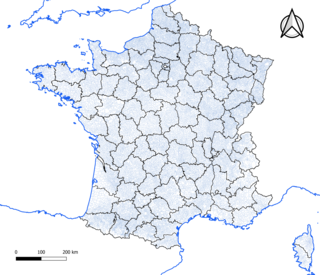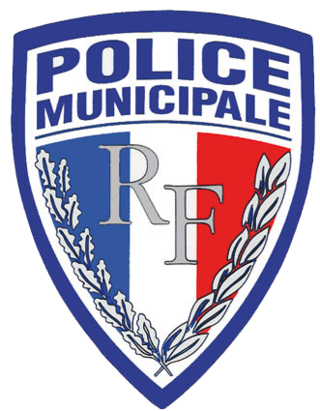
Réunion is an overseas département of France.

In the administrative divisions of France, the department is one of the three levels of government under the national level, between the administrative regions and the communes. Ninety-six departments are in metropolitan France, with an additional five constituting overseas departments, which are also classified as overseas regions. Departments are further subdivided into 333 arrondissements and 2,054 cantons. These last two levels of government have no political autonomy, instead serving as the administrative basis for the local organisation of police, fire departments as well as, in certain cases, elections.

Prefect is a magisterial title of varying definition, but essentially refers to the leader of an administrative area.

The National Assembly is the lower house of the bicameral French Parliament under the Fifth Republic, the upper house being the Senate. The National Assembly's legislators are known as députés, meaning "delegate" or "envoy" in English; etymologically, it is a cognate of the English word deputy, the standard term for legislators in many parliamentary systems.

The commune is a level of administrative division in the French Republic. French communes are analogous to civil townships and incorporated municipalities in the United States and Canada, Gemeinden in Germany, comuni in Italy, or municipios in Spain. The UK equivalent are civil parishes. Communes are based on historical geographic communities or villages and are vested with significant powers to manage the populations and land of the geographic area covered. The communes are the fourth-level administrative divisions of France.
A territorial collectivity, or territorial authority, in many francophone countries, is a legal entity governed by public law that exercises within its territory certain powers devolved to it by the State as part of a decentralization process. In France, it also refers to a chartered administrative division of France with recognized governing authority. It is the generic name for any territory with an elective form of local government and local regulatory authority. The nature of a French territorial collectivity is set forth in Article 72 of the Constitution of France (1958), which provides for local autonomy within limits prescribed by law.

France is a unitary semi-presidential republic with a bicameral legislature. Public officials in the legislative and executive branches are either elected by the citizens or appointed by elected officials. Referenda may also be called to consult the French citizenry directly on a particular question, especially one which concerns amendment to the Constitution.
In France, a municipal arrondissement is a subdivision of the commune, and is used in the country's three largest cities: Paris, Lyon and Marseille. It functions as an even lower administrative division, with its own mayor. Although usually referred to simply as "arrondissements", they should not be confused with departmental arrondissements, which are groupings of communes within one département.
Senegal is subdivided into four levels of administrative divisions.

The Council of Paris is the deliberative body responsible for governing Paris, the capital of France. It possesses both the powers of a municipal council and those of a departmental council for the département de Paris, as defined by the so-called PLM Law of 1982 that redefined the governance of Paris, Lyon and Marseille. Paris is the only territorial collectivity in France to be both a commune and a département.

The municipal police are the local police of towns and cities in France. There are 24,000 municipal police officers in 4,555 communities. The municipal police are one of the three components of French policing, alongside the National Police and the National Gendarmerie, with about 145,000 police and 98,000 soldiers respectively.

Brie is a commune in the department of Aisne in Hauts-de-France in northern France.

A commune is the third-level administrative unit in Mali. Mali is divided into eight regions and one capital district (Bamako). These subdivisions bear the name of their principal city. The regions are divided into 49 cercles. The cercles and the district are divided into 703 communes, with 36 urban communes and 667 rural communes, while some larger cercles still contain arrondissements above the commune level, these are organisational areas with no independent power or office. Rural communes are subdivided into villages, while urban communes are subdivided into quartier. Communes usually bear the name of their principal town. The capital, Bamako, consists of six urban communes. There were initially 701 communes until Law No. 01-043 of 7 June 2001 created two new rural communes in the desert region in the north east of the country: Alata, Ménaka Cercle in the Gao Region and Intadjedite, Tin-Essako Cercle in the Kidal Region.

Niger is governed through a four layer, semi-decentralised series of administrative divisions. Begun 1992, and finally approved with the formation of the Fifth Republic of Niger on 18 July 1999, Niger has been enacting a plan for decentralisation of some state powers to local bodies. Prior to the 1999-2006 project, Niger's subdivisions were administered via direct appointment from the central government in Niamey. Beginning with Niger's first municipal elections of 2 February 1999, the nation started electing local officials for the first time. Citizens now elect local committee representatives in each commune, chosen by subdivisions of the commune: "quarters" in towns and "villages" in rural areas, with additional groupings for traditional polities and nomadic populations. These officials choose mayors, and from them are drawn representatives to the department level. The departmental council, prefect, and representatives to the regional level are chosen here using the same procedure. The system is repeated a regional level, with a regional prefect, council, and representatives to the High Council of Territorial Collectives. The HCCT has only advisory powers, but its members have some financial, planning, educational and environmental powers. The central government oversees this process through the office of the Minister of State for the Interior, Public Safety and Decentralization.

Municipal elections in France allow the people to elect members of the City Council in each commune. These are called conseillers municipaux. They elect the mayor, who chairs the city council, as well as Deputies to the Mayor. The term of office of councilors, the mayor and his deputies is, in principle, six years.

In France, a municipal council is an elected body of the commune responsible for "executing, in its deliberations, the business of the town" (translated).

In France, a special delegation in a municipal organization is a delegation of several members appointed by a representative of the state following the dissolution or resignation of a municipal council or another organization to perform the functions of mayor or president. The powers of a special delegation are limited to acts of pure administration and emergency management.

Senators in France are elected by indirect universal suffrage, by a panel of "electors". Half of the Senate seats are up for election every three years; the term of office is six years.
Administrative police in France are French police tasked with preventing disturbances to the ordre public. and ensuring the public peace and preventing crime. Ordre public or public peace in a society includes public tranquility, safety and well-being. Two types of ordre public exist:
Conseil d'arrondissement can have different meanings depending on the country.














